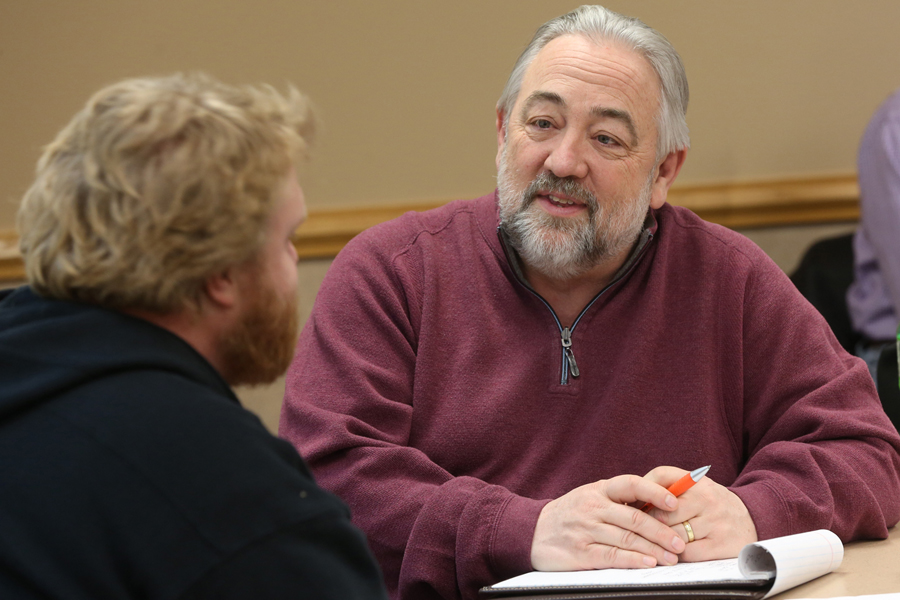Brian Kennedy was first accepted to William Mitchell College of Law in 1981 but did not attend because, as he puts it, “life got in the way.” The 59-year-old Texan’s dream of attending the Minnesota law school has come true now that he is a member of the school’s inaugural hybrid class.
The program, launched Jan. 12, is a four-year part-time J.D. that combines semester-long online classes with a total of 10 weeks of on-campus practical training. Annual tuition is $27,770, the same cost for on-campus part-time students. It is the first of its kind, under special variance from the American Bar Association.
“The word pioneer keeps coming up. We’ve got to blaze this trail for others,” Kennedy said. “There’s a feeling from talking to people that we know we’re not only going to show everybody that this is the right way to have an avenue [into hybrid learning] but that we were the right people to pick.”
The 85 students range from ages 22 to 67, come from 30 states, two countries and have an array of credentials and careers.
“It’s a diverse group of individuals that all have their own life circumstances that have led them here. But they all share the desire to become lawyers,” said Dean Eric Janus, who started the planning process for the hybrid in 2010.
The aspiring lawyers are baggage handlers, college professors, bankers and business executives like Kennedy who is CEO of the El Paso Sports Commission. A third of students have advanced degrees including 14 MBA degrees, five medical doctors and three Ph.D. degrees.
“We’re thrilled to have people with high credentials but are also excited to have the baggage handler who always dreamed of being a lawyer but has a family and has to keep his job,” said Professor Sarah Deer. “That brings another real world element to the class.”
Classes are offered asynchronously, meaning students can listen to lectures or post comments and questions on discussion boards at their convenience.
“One of our key missions is accessibility,” Janus said. “Students are uniformly expressing gratitude for the fact that we have made this kind of program available. Our goal has been to make it a rigorous program that’s accessible. It is not by any means less rigorous than our normal J.D. program.”
If anything, online programs can be more challenging for students and professors, Deer said, who has been teaching online courses since 2003.
“It is harder to teach and take courses online,” she said. “I think there’s a myth that you can scoot by, but it is actually more work.”
Students are held accountable for weekly assignments, which is a higher frequency than in traditional residential classes. But professors are also providing weekly feedback, which increases the amount of individual attention they receive, Deer said.
“It takes a lot of self discipline,” Kennedy said. “You have got to commit yourself to the discipline of doing the work. I like it because it allows me to work my schedule around school. It is a perfect fit for me.”
The on-campus portion of the program takes two forms: preparatory weeks at the beginning of the first and third semester and capstone weeks at the end of each semester focused on practical training.
“Starting out with an in-house week was a really brilliant move,” Kennedy said. “Bringing us together really allowed us to start personal relationships. Had I just started Internet classes without the prep week, I wouldn’t know the personalities of the people I’m talking to and wouldn’t have gotten my support system together. We showed up as 85 individuals and became a class during that first week.”
Janus is the first to acknowledge that there are some lawyering skills that can only be acquired through face-to-face learning, hence the heavy practical emphasis during the capstone weeks. During the online semester, students learn about the nuts and bolts of the law and then apply their knowledge in practical activates such as hypotheticals or interviews.
“When they come to campus in April, they will have that knowledge built up and I’ll give them the opportunity to interview a defendant played by an actor,” Deer said. “They’ll take what they’ve learned and act out the things we’ve been reading about to get important feedback about things like eye contact and body language.”
The program is still in its infancy but people are eager to see what it can become, students and professors alike.
“It’s exciting to see them so committed to law, not that my full-time students aren’t, but you have to want it more than the average law student because of the nature of the program,” Deer said. “I’m more excited to be a professor than I have in years because there is a whole new energy around.”

